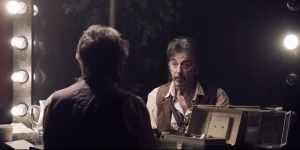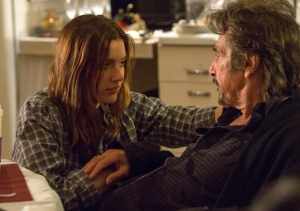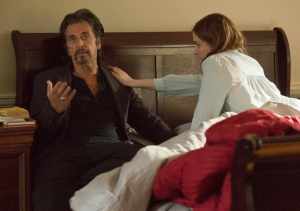The Humbling: Living in the Immaterial World

The quandary that has constricted Simon Axler’s life is perplexing to the point of intellectual exhaustion. It isn’t as simple as his having a few bad performances at the theater. He’s had those, and he is able to recover from them with relative ease. What is happening is much more insidious in nature, much more permanent. As it is said over and over again in Philip Roth’s 2009 novel The Humbling, Simon Axler, “…simply couldn’t act.” It’s bizarre to say the least and it is rather brave of Roth to offer no easy solutions or interpretations. To understand Axler, one must first ponder the following: what would it mean to devote one’s life to acting, which in a way is the art of not being yourself?
In Mother Night, Kurt Vonnegut writes, “We are what we pretend to be, so we must be careful about what we pretend to be.” Axler, being a stage actor, has more or less made a living out of pretending to be other people, or more accurately, pretending to be characters that don’t even exist (I’d attempt to dive into the meta-literary nature of the novel seeing as how a fictional character is pretending to be other fictional characters, but I fear that would cause a tear in the fabric of reality, so perhaps it’s best I abstain).
While his is an odd practice, it’s at least forgivable. For centuries, the art of acting has been practiced and honed to the point that an entire industry has been built around it. On a more personal level, how many of us haven’t wished that we possessed Tyrion Lannister’s wit and sly charm, Han Solo’s swagger, or Will Kane’s devotion to justice? We quote such characters, make references to them, and often embrace the ideals they stand for while remaining comfortably on the sane side of reality. The problem with Axler is that his job requires him to cross the line between the abstract and the concrete, and if he is to be successful, he must be able to leap nimbly between the two on a nearly constant basis.

But then he can’t. Out of nowhere he just loses his ability to act, or as it reads in the novel, “to speak and be spoken to.” Roth offers some possible explanations for Axler’s sudden loss of talent; his home life is pretty tumultuous, being in the middle of a second marriage with a woman who doesn’t care much for what he does and a drug addled step-son who he hasn’t spoken to in years. Another possible reason is his age. Axler is pushing 70 and it would make sense that he’d naturally start losing his skill. At that age, movement and memorization (both key elements in the art of acting) are both impaired, so from a purely biological standpoint, Axler is succumbing to the ailments of dotage.
More importantly, however, Axler is coming to the realization that he hasn’t truly lived, but rather has lived vicariously through other characters for most of his life. He lives in the third person through the point of view of fictional beings whose job it is to provide commentary on the human condition, rather than living in the first person and directly experiencing the human condition.
But it isn’t an easy realization to come to. In fact, when he first recognizes it, he is immediately cast into a deep depression that actually has him contemplating suicide. To avoid it and in the hopes of one day recovering his lost craft, Axler decides to go to a mental institution where he may find the time and the means to mend himself. During his time there, he becomes acquainted with Sybil Van Buren, a terribly distraught woman who went a step beyond Axler and actually attempted suicide.

Ultimately, the two become friends of a sort, and having gotten comfortable with his presence, Sybil relays to Axler the reason for her suicide attempt. She tells him that one day she caught her second husband molesting her little girl. He told her it wasn’t a big deal, that the girl had asked him to check her because she had been feeling some irritation in her private region, and that nothing illicit was occurring.
Sybil, incapable of grasping the gravity of what she had witnessed, decided to take her husband’s word for it, and left her daughter with him while she went grocery shopping. But all the while she knew. Deep down she knew her husband was lying and doing God knows what else to her daughter. She couldn’t forgive herself for having abandoned her to him, and finding that she had failed in her duties as a mother, decided to kill herself with sleeping pills. It didn’t work, and instead of getting her children as far away from her husband as possible, she is miles away in an institution.
Axler, who simply listens to Sybil’s entire story, inputs a genuine, “I’m sorry” at the end of her tragic tale. Offering condolences is what any decent person would do, and about all any decent person could do in that situation, but it’s also clear that Axler has been humbled by a woman who has experienced an actual tragedy.
One of the main characteristics of tragedies is that they tend to occur without any warning and, at least at first, are inherently hopeless by nature. It is why it’s sad to hear of the passing of a 98-year-old man who lived a full and wonderful life, but it’s shocking to hear that a plane crashed killing all 257 of its passengers. One of those events can be, to some degree, predicted. The other one, being a purely freak occurrence, is much harder to contend with. All the tragedies that Axler had experienced in his life were literally scripted.

When he performed Romeo and Juliet, he already knew that the star-crossed lovers were doomed, so there was no sense of sadness at witnessing their demise. The same goes for Othello, Death of a Salesman, The Seagull, or any of the other plays that he starred in. But when he comes face to face with the real, gritty, repulsive nature of tragedy, he is completely at a loss. He can’t wrap his mind around Sybil’s tragedy, not because he doesn’t care, but because he’s only known tragedy to be an event that occurs in Act Three.
When Sybil asks him if he’d kill her husband for what he’d done, Axler says no because he’d probably, “botch it.” This is more than just a darkly humorous quip; it is revealing of Axler’s nature. His rejecting Sybil’s offer is similar to an amateur actor refusing to take the lead role in a play. He knows he’d mess something up the same way one would mess up their lines or direction if they were in a performance. Axler, having experienced very few human moments in his life, can’t really understand what to make of genuine human emotions. All he can do is observe and be humbled.
Upon leaving the institution, Axler is approached by his agent, Jerry Oppenheim, who tells him that he’s got a couple of gigs set for him, including the lead role in Long Day’s Journey into Night. Axler declines the offer, citing that he’s simply not ready and that he needs some more time to regain his skill. Oppenheim suggests meeting with Vincent Daniels, an acting coach who could help Axler out, but again, Axler refuses. It’s not a coincidence that Axler doesn’t immediately want to return to acting right after having heard Sybil’s story.
If anything, having heard of her troubles, Axler realizes that life, even with its tragedies, is worth living, and that to devote one’s life to acting, to miming life, is empty. In this sense, Axler isn’t really looking for his skill, but rather is trying to live life for the first time, to connect with real people in the real world.

He sees this opportunity in the form of Pegeen Mike Stapleford, the 40-year-old daughter of a pair of actors that Axler knew in his youth. Their initial meeting is innocent enough. They talk about how long it’s been since they had seen one another, Pegeen tells Axler that she’s moved into the area because she’s teaching at a nearby woman’s college and that she had recently broken up with a girlfriend who had decided to undergo sexual reassignment surgery. Axler recounts his stay at the institution and asks about her parents and if she’s doing any better after the break-up. It’s a simple enough exchange, but after a few more encounters, it becomes clear that the two of them aren’t content with cultivating a simple “howdy-neighbor” relationship, and instead want to throw some passion into the mix.
It’s a bizarre courting to say the least. Pegeen had made it clear to Axler that while she has lesbian inclinations, she’s not one to shy away from novelty. Axler, on the other hand, is a bit perturbed about the notion of sleeping with the daughter of some of his dearest friends, a woman he first met when she was an infant. Moreover, there’s the impressive age gap, with he being 65 and she being 40. Still, the pair decide to give it a go and end up becoming lovers.
This is the point when Roth injects a rather heavy dose of irony into his story. After a few sex-filled nights, Axler decides that he wants to show his gratitude to Pegeen for bringing some warmth back into his life. He does so by buying her a mountain of gifts, including jewelry, dresses, and a trip to the local beauty parlor. This is a far-cry from what Pegeen is normally used to seeing as how she’s always fancied herself a butch lesbian who is more content with short cropped hair and torn jeans than a blowout and pencil skirt. But she goes along with it and even comes to enjoy it. Axler goes on to buy her lingerie and make-up, all things that he believes a straight, feminine woman would want.
This seems nice at first, and Axler presents these offerings as true signs of his affection. But what is he doing if not manipulating Pegeen’s image into what he’d prefer her to be? Gone is the tomboy Pegeen with masculine features, and in comes the beautiful, lady-like Pegeen who is all woman. Underlying this shopping spree of monumental proportions is a strange kind of revenge. Axler, who for decades was the actor, the one who took direction, is now exerting his will on the world. The world isn’t just a stage, it is his stage, and now that he has someone who is willing to share it with him, he wants to make sure that she meets up to his expectations.
Worse yet, Pegeen expresses a genuine interest in wanting to maintain a relationship with Axler. The two of them agree to tell Pegeen’s parents (who are a bit shocked and concerned) and continue right on with their affair. Continue, actually, isn’t the right word. Their relationship is amplified to the point where they begin to commit acts that are downright appalling in nature. They begin experimenting more and more in the bedroom, with the help of a couple… gizmos that Pegeen kept from her “lesbian days,” and when that gets boring, they decide to get a young lady at the local bar drunk enough to want to have a threesome at Axler’s home.
It’s a whirlwind of bad, or at least poorly thought out decisions, but Axler and Pegeen can’t see the forest for the trees. They just go. They, “Play the moment, play whatever plays for [them] in that moment, and then go to the next moment.”

And then the real tragedy hits. Axler decides that he wants Pegeen entirely, not just as a lover and friend, but as the mother of his children. He imagines how their life will look like. They’ll have some kids, maybe get married, watch them grow no matter what, and live a fulfilling life together. He visits a doctor to learn if there are any potential dangers to a man his age attempting to conceive, and the doctor says there isn’t anything glaring. With the happy news in hand, he prepares to tell Pegeen the same day. After dinner, he drops the news and the proposition, and not only does she say no, she says that she’s done with “this.”
Axler is heartbroken and apoplectic. He chides Pegeen, and Pegeen fires right back, calling their relationship (and by implication him) a mistake. She leaves and he immediately blames her parents. “They must have gotten to her,” he believes, and phones them. After bombarding them with abuse, Asa, Pegeen’s father, reveals to Axler that they had no idea that she was even planning on breaking up with him, and that it’s just as much of a surprise to them as it is for Axler.
Axler hangs up and stews in his despair, believing that there is nothing left for him. His world, the story that he was trying to write for himself and Pegeen was dashed away in seconds because of her finicky nature. Axler goes up to his attic, takes out his shotgun, and places it in his mouth. Even then, he finds it’s a lot harder to pull the trigger than he first thought. So what does he do? He pretends he’s performing in front of an audience, re-enacting the final moments of Chekhov’s The Seagull. With his motivation in place, he kills himself.
What ultimately led to Axler’s suicide? Was it just a matter of Pegeen leaving him? Was it humiliation? Despair? It may be all these things, but above all it’s because Axler made the mistake of thinking that if you aren’t the actor in life, then you are the director. If you aren’t the person who has to deal with life’s myriad situations, then you are the one who creates those situations. After having spent so much time pretending to live, Axler got a dose of real life and enjoyed it. He enjoyed it so much in fact that he believed that he could command people to live the way he thought they should.

But that’s not how it works. Life isn’t a trade off between being the director and the directed. It’s so much more complicated than that, so much deeper and meaningful than that. In fact, one could probably say that life is at it’s most beautiful when you reach a moment where you don’t have to become someone (which is what acting is), but rather get to be someone. Axler tried to get to that moment, but it eluded him, and rather than realize that there’s still a lot of life in him, he resigns himself to despair and takes his own life, believing that he has reached the end of his own personal play. The saddest thing about this story: he doesn’t even die as Simon Axler. He dies as Konstantin from The Seagull.
Works Cited
1. Roth, Philip. The Humbling. New York City: Harcourt Publishing Company, 2009. Print.
2. Vonnegut, Kurt. Mother Night. New York City: Random House, 2009. Print
What do you think? Leave a comment.











This is a very well written article. I think you have some deep insights and a great style. Well done!
DClarke,
Thank you for the kind words.
-August
Simon Axler is almost as off-putting a Roth protagonist as is David Kapesh, and this was basically just a quick read to be disposed of before getting to his last book.
Eggleston,
I wouldn’t say this was a disposable book, but I agree that Roth certainly has a knack for creating despicable protagonists. I’d say Kepesh’s cowardly and selfish nature makes him a bit worse. Axler was more tragic in my opinion. There were times when he genuinely wanted to do what was right, but in the end, both is own foolishness and the capriciousness of others kept him from decent things with his life.
Thanks for the comment,
August
Finished the novel, and I’m now ready to see the movie.
deniro,
I hope it’s good.
-August
Melodramatic tale of a washed up actor who falls apart. The ending is cliche, but at least it is a very quick read.
Kindle,
I thought it was a very good, albeit bleak, novel. I wonder if the reason I enjoy it so much is because it’s the first Roth book I’ve ever read. Hopefully not; I’d like to think it was good on its own merits.
-August
found it to be a haunting and bleak novel.
nooore,
That’s for sure.
-August
No one writes better than Mr. Roth. I was particularly interested in this book because it’s about a stage actor (that being my first profession)!
Cornish,
While he’s far from my favorite authors (I’m partial to Khaled Hosseini, Dennis Lehane, David Benioff, and John Steinbeck), he certainly has a wonderful command of language and the storytelling craft. Being the first book of his that I’ve read, it certainly made an impression, one that I hope is confirmed in any books of his that I read in the future.
Thanks for the comment,
August
What the hell has happened to Pacino? Since Scarface and the Godfather days, he has been one of my favourite actors but he has really made some crap lately.
If you want to see Al Pacino in a good, more recent performance, I recommend you watch You Don’t Know Jack, as well as The Humbling.
Deaton,
Unfortunately, I’d say you’re right when it comes to Pacino’s latest roles. Frankly, I think the last great role he had was in The Insider, and that’s going on twenty years ago. Hopefully he ends up making that movie with Scorsese, DeNiro, and Pesi.
Thanks for the comment,
August
it is always good to see Al Pacino.
charlie,
I certainly hopes he’s able to start working in more serious roles. It seems like he’s only had cameos in rom-com’s and indie roles for the past decade or so. It’d be nice to see him back in his leading-man form.
-August
Roth is. This book deceived me… Strange, unreal characters and in the end, I didn’t care anymore…
Wanita,
It was certainly a sorrowful book.
-August
The most interesting thing about it to me was that it reminded me of the great plays of Ibsen and Strindberg.
Anik,
I’ve only ever read The Doll House. Maybe I’ll check out some of their other works if it is similar to The Humbling.
-August
Future writing classes should study this novella length book. Not a word is wasted.
chadz,
I’d certainly find it to be a worthy book to study in a workshop/writing class. Short, impressive, and emotional. And all in only about 200 pages.
-August
To be honest I just didn’t enjoy being immersed in this story/journey. A little too graphic for my taste, a little too depressing.
Lovie,
I agree that it was graphic and depressing, but I suppose I looked at it through the lens of a tragedy. That doesn’t make the bad parts okay, but it at least gives one a tone to expect.
Thanks for the comment,
August
I really got frustrated and annoyed with this film because Al Pacino is chatting complete crap from the beginning to the end.
reaves,
I haven’t seen it yet. If that’s so, it’s a real bummer.
-August
The weakest of Roth’s later novellas.
Xavier,
It may be because The Humbling was my first of Roth’s novels, but I thought it was just fine. I’ve read The Breast and think will finish the Kepesh novels, as well as his other novellas. On the whole, though, I thought The Humbling was great.
-August
Roth´s command of english never fails to surprise me.
Palumbo,
He certainly is a gifted writer.
-August
What happens when a man loses the one thing that defines him as a human being? Lovely piece.
Nance,
I appreciate your kind words. Unless you’re calling The Humbling a lovely piece, in which case I’d say it’s more mournful than lovely.
No matter what, thanks for the comment.
-August
Please remind that I am not mature enough to read the mature content of Roth’s novels.
ray,
He can get awfully graphic, can’t he?
-August
Strange that in the movie version, Simon Axler (Al Pacino), attempts suicide on stage, the same plot twist of “Birdman.”
Chaseer,
That is an odd twist. In the book, he commits suicide alone in his cabin. It’s interesting to note that both movies came out at roughly the same time. I wonder if the film adaptation of The Humbling wasn’t trying to nod at Birdman since their similar in some regards.
Thanks for the comment,
August
Roth writes without discontinuation in his story, flipping through pages had never been easier.
Bunk,
I’ve only listened to two of his books, The Humbling and The Breast. I do, however, want to read a couple of them just to see how my own mental cadence reads the books.
Still, while listening to the books, it was clear that he has a really well-balanced way of writing. While he does employ a lot of twenty dollar words, they always manage to elicit a specific effect. And even then, he doesn’t use them all that often. He really is an author that relies on his characters to propel the story, rather than the style.
Thanks for the comment,
August
I just finished reading this Philip Roth book which I wanted to read first before seeing the Al Pacino film based upon it. It’s your typically well written, fascinating Roth with all of his unexpected plot twists.
Stine,
It was certainly a memorable and meaningful story. I hope the movie does it some measure of justice. From what I’ve heard, it was a bit sub-par.
Thanks for the comment,
August
The potentially very interesting psychological questions that underlie the action of The Humbling are left almost completely unaddressed.
Chilton,
Which psychological questions are those?
-August
I loved this book. I loved the style of writing and the flow of the authors words.
Lak,
Roth’s flow is pretty excellent. While at times I think he can be a tad wordy, his writing never gets convoluted or pretentious. He presents the story in a clear way, and as you said, in a manner that flows well.
-August
This is a stripping of all of the trappings of life in a similar way that the Biblical Job was, but without the death.